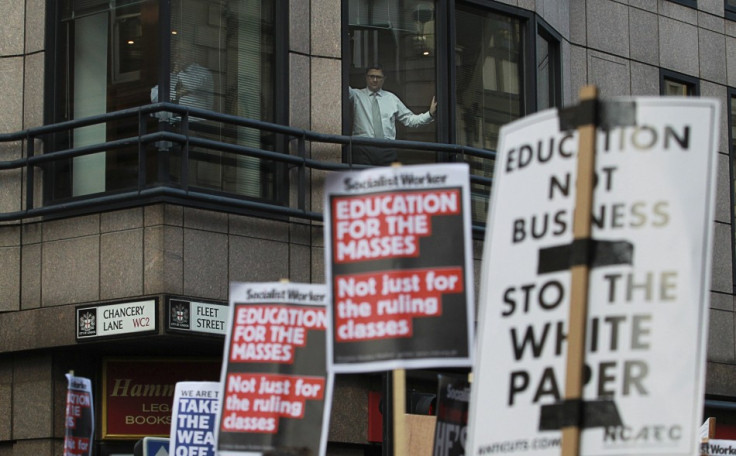UK Unemployment: University Policy Should Be Driven By Meritocracy, Not Equality

Students no longer yearn to discover the mechanics of the universe, hold intellectual duels over Aristotle's legacy or investigate whether King John was really our most unpopular monarch.
No, instead of learning for joy, students study for substantial salaries.
You can't blame them.
Under New Labour tuition fees rose to £3,290 and by 2012 the Coalition Government had introduced the £9,000 fee cap, following recommendations made by the Browne Review.
The political class' pursuit of Academia PLC even led to postgraduate research being judged on 'social impact', rather than its own merit.
The main consequence of the privatisation programme is that students now undertake a cost-benefit analysis to see if their prospective degree course is economically 'worth it'.
And ultimately they're faced with an important question: Why follow intellectual rigour, when you can follow the money?
Is Going to University Pointless?
Thousands of undergraduates flock to our universities each autumn knowing full well that they will in-debt themselves for decades to come and compete, as Simon Dolan rightly points out in his 'UK Unemployment: Why University if a waste of time' article, in a highly competitive job market upon graduation.
This strange phenomenon is the result of one of New Labour's most cynical social engineering plans -- the 50% target.
Tony Blair's flagship programme of encouraging 50% of all young people to attended university has been a success.
Official figures released this year in the Higher Education Initial Participation Rate revealed that university entry levels reached 49% of young people in 2011 - 2012.
It is politically unpopular to challenge the 50% plan. Who could argue against such a system? It encourages equality of opportunity.
It creates a 'high-skilled knowledge economy'. And it minimises the number of young people who 'miss out'.
But in reality the 50% programme sabotages social mobility.
Employers Taking Advantage of Situation
By allowing thousands more students into universities, standards have been driven down and the undergraduate degree has been devalued.
Here I agree with Dolan. For a large number of young people, university is pointless. They're there because of their friends.
They're there because they don't want to miss out. They're not interested in academia.
An undergraduate qualification is no longer enough to start a career and students are forced to undertake internships to gain valuable experience.
Many of these internships are unpaid and prevent graduates from working and lower-middle class backgrounds to get a foothold in their chosen profession.
Employers have taken advantage of this unfortunate situation and there now exists a mass market of free labour trading under the 'unpaid internship' banner.
Likewise, young people with the desire to study at postgraduate level are faced with a similar problem.
Barrier for Poorer Students
Earlier this year, the Sutton Trust revealed that the high costs involved in financing a master's degree, and the rising number of people with postgraduate degrees, meant that a social mobility barrier has been erected for poorer students.
The levelling-up illusion has been created to maintain the pretence that our state schools are providing young people with a decent education.
After all, how can they be that bad if more and more people are going to university? But what kind of universities are normal kids attending?
Well, independent school pupils only make up 7% of the school population, but they are over-represented throughout the country's top higher education institutions, the Russell Group universities.
The political class time and again blame universities for this undesirable phenomenon.
For example, David Willetts, the universities minister, has declared that top universities should treat white working-class boys like ethnic minorities and introduce positive discrimination measures to boost their numbers at Russell Group universities.
Likewise, in 2009, Peter Mandelson proposed that prestigious universities should take lower entry grades from students from poorer backgrounds.
The real reason why Willetts and Mandelson want to lower standards is because reforming our failing secondary school system, which is what needs to be done, would be a highly unpopular project.
So the political class wrongfully blame private schools for fulfilling their remit and attack Russell Group universities for refusing to undermine their academic integrity.
It's certainly a grim picture, and no doubt Dolan would intervene here to argue that some young people should abstain from university to set-up businesses.
I agree, but academia pursued properly isn't a waste of three years, as Dolan suggests.
It needs to be reclaimed from the politicians.
Yes, youth-unemployment means young people have to make very careful choices and yes, becoming an entrepreneur is an admirable pursuit.
However, success shouldn't be conflated solely with wealth.
Higher education can be as fulfilling as making a million, but university policy should be driven meritocracy, not equality.
Ian Silvera is a business journalist based in London. His work has appeared in the Guardian, The Muckraker and the Bureau of Investigative Journalism, among others. He's on twitter: @ianjsilvera
© Copyright IBTimes 2025. All rights reserved.






















